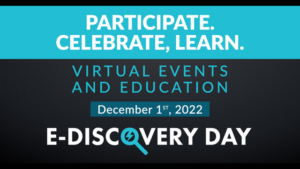
Since its inception in 2015, E-Discovery Day has grown a lot over the years. Almost 20,000 people have participated in one way or another over the last seven celebrations of the growing and vital role of e-discovery in the legal process. Exterro and its partners—almost 40 different organizations over the years—have hosted 84 official webinars and over 50 official events. We can’t even count all the local gatherings and virtual events that have been hosted during the first week of December every year.
A lot has changed in the world of E-Discovery Day, too. No one knew in the winter of 2019, when Exterro and partners hosted 16 live events across the country, that we’d be moving almost exclusively online for the next two years. (And by “we,” I definitely mean all of us, not just e-discovery professionals. Now, e-discovery pros are probably among the people best able to perform their work in a virtual environment, but that doesn’t mean they don’t enjoy getting together in person to celebrate, network, and kick off the holiday season in style.
Sometimes the difficult person is opposing counsel, who refuses to cooperate in hope of getting a gotcha moment, especially if their case is weak. And I hate to say it, but sometimes it can be a neanderthal judge, who doesn’t understand the technology and tells you to press the Staples “Easy Button” and produce all million emails within 30 days
Judge Andrew Peck (ret.)
But one thing that has remained constant over the last eight years is the involvement of Hon. Andrew Peck (ret.), now Senior Counsel at DLA Piper, in E-Discovery Day. I reached out to him recently to ask him some questions about the celebration and his participation in it.
“I have been involved, either as a speaker or at least a listener, since the first E-Discovery Day. It’s hard to believe this is number eight. Time sure does fly,” he said. In that spirit, I asked Judge Peck to think about some of the people who had influenced him, and he was quick to acknowledge “the early e-discovery pied pipers, such as the late Browning Marean—part of my reason for joining DLA Piper when I retired from the Bench was in tribute to him.”
When asked why it’s important for people to participate, he touched upon the core reason Exterro and our partners organize these events, “One learns from others. Many of us face the same issues, and it’s good to hear how others deal with it, and hopefully learn from them.”
I followed up with a couple of questions based on the findings of our light-hearted e-discovery survey (which had prizes of ACEDS Certification Scholarships for two lucky winners this year.
Q: Both years, respondents said law firm attorneys were the hardest parties to work with on e-discovery activities. You’ve served on the bench and the bar–is it true?
“The answer of course is, “It depends.” Sometimes the client is the problem, sometimes it is the dinosaur senior partner who wants to do e-discovery the way he learned discovery in the good old paper days, when the volume was much smaller and the technology available was post-it notes. Eyes on review on every document might be the gold standard when dealing with 1,000 documents, but it is not when dealing with a million documents. One should embrace technological advances, like TAR.
“Sometimes the difficult person is opposing counsel, who refuses to cooperate in hope of getting a gotcha moment, especially if their case is weak. And I hate to say it, but sometimes it can be a neanderthal judge, who doesn’t understand the technology and tells you to press the Staples “Easy Button” and produce all million emails within 30 days.”
Knowing Judge Peck’s opinion on FRE 502, I may have been cheating asking this next question… but I did it anyway.
Q: By a hair’s breadth (2.4%), respondents said their favorite part of FRE 502 was (b), not (d), although 38% of respondents chose, “What’s 502?” Any thoughts on this?
“You get 502 (b) automatically in federal court. But if you use 502 (b), it gives you some protection, but you are subject to Monday morning quarterbacking, that is, second guessing by the opposing party and the court on whether your privilege review was really careful enough.
“To me, 502 (d) is a no brainer; it is your get out of jail free card, so much so that I’ve said it is akin to malpractice not to consider getting a 502 (d) order. I see no real downside to it, and lots of protection. No matter how good your privilege review process is, with the amount of ESI in most cases, something will slip through, even if it’s only an email from employee A to employee B saying, ‘Jim said to do X,’ and the reviewers don’t realize that the Jim being referred to is outside counsel James Smith.
“And it is scary that more than a third of the respondents said, “What’s 502?” That’s why I talk about it at almost every conference I speak at.”
And finally, I asked the question that everybody’s dying to get resolved once and for all (or at least some of our E-Discovery Day sponsors at eDiscovery Today and ACEDS).
Q: About two-thirds of people prefer “eDiscovery” over “e-discovery.” What gives?
“In response to a similar poll, I voted for discovery. No “e” is needed. Basically, almost all discovery is ediscovery. And no need for the hyphen in any event, as it’s one less character to type.”
There you have it—it’s just discovery. Now we just have to convince everyone to drop the “e.” Maybe that will be a good topic for an E-Discovery Day 2023 webinar!
To find out about this year’s live and virtual E-Discovery Day events, visit https://www.e-discoveryday.com. Please don’t remove the hyphen, or the “e” from the URL, though!


